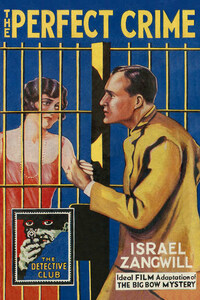CHAPTER I
SHOWING HOW THE WICKED PHILANTHROPIST WAS TURNED INTO A FISH-PORTER
In the days when Lord George Gordon became a Jew, and was suspected of insanity; when, out of respect for the prophecies, England denied her Jews every civic right except that of paying taxes; when the Gentleman's Magazine had ill words for the infidel alien; when Jewish marriages were invalid and bequests for Hebrew colleges void; when a prophet prophesying Primrose Day would have been set in the stocks, though Pitt inclined his private ear to Benjamin Goldsmid's views on the foreign loans – in those days, when Tevele Schiff was Rabbi in Israel, and Dr. de Falk, the Master of the Tetragrammaton, saint and Cabbalistic conjuror, flourished in Wellclose Square, and the composer of "The Death of Nelson" was a choir-boy in the Great Synagogue; Joseph Grobstock, pillar of the same, emerged one afternoon into the spring sunshine at the fag-end of the departing stream of worshippers. In his hand was a large canvas bag, and in his eye a twinkle.
There had been a special service of prayer and thanksgiving for the happy restoration of his Majesty's health, and the cantor had interceded tunefully with Providence on behalf of Royal George and "our most amiable Queen, Charlotte." The congregation was large and fashionable – far more so than when only a heavenly sovereign was concerned – and so the courtyard was thronged with a string of Schnorrers (beggars), awaiting the exit of the audience, much as the vestibule of the opera-house is lined by footmen.
They were a motley crew, with tangled beards and long hair that fell in curls, if not the curls of the period; but the gaberdines of the German Ghettoes had been in most cases exchanged for the knee-breeches and many-buttoned jacket of the Londoner. When the clothes one has brought from the Continent wear out, one must needs adopt the attire of one's superiors, or be reduced to buying. Many bore staves, and had their loins girded up with coloured handkerchiefs, as though ready at any moment to return from the Captivity. Their woebegone air was achieved almost entirely by not washing – it owed little to nature, to adventitious aids in the shape of deformities. The merest sprinkling boasted of physical afflictions, and none exposed sores like the lazars of Italy or contortions like the cripples of Constantinople. Such crude methods are eschewed in the fine art of schnorring. A green shade might denote weakness of sight, but the stone-blind man bore no braggart placard – his infirmity was an old established concern well known to the public, and conferring upon the proprietor a definite status in the community. He was no anonymous atom, such as drifts blindly through Christendom, vagrant and apologetic. Rarest of all sights in this pageantry of Jewish pauperdom was the hollow trouser-leg or the empty sleeve, or the wooden limb fulfilling either and pushing out a proclamatory peg.
When the pack of Schnorrers caught sight of Joseph Grobstock, they fell upon him full-cry, blessing him. He, nothing surprised, brushed pompously through the benedictions, though the twinkle in his eye became a roguish gleam. Outside the iron gates, where the throng was thickest, and where some elegant chariots that had brought worshippers from distant Hackney were preparing to start, he came to a standstill, surrounded by clamouring Schnorrers, and dipped his hand slowly and ceremoniously into the bag. There was a moment of breathless expectation among the beggars, and Joseph Grobstock had a moment of exquisite consciousness of importance, as he stood there swelling in the sunshine. There was no middle class to speak of in the eighteenth-century Jewry; the world was divided into rich and poor, and the rich were very, very rich, and the poor very, very poor, so that everyone knew his station. Joseph Grobstock was satisfied with that in which it had pleased God to place him. He was a jovial, heavy-jowled creature, whose clean-shaven chin was doubling, and he was habited like a person of the first respectability in a beautiful blue body-coat with a row of big yellow buttons. The frilled shirt front, high collar of the very newest fashion, and copious white neckerchief showed off the massive fleshiness of the red throat. His hat was of the Quaker pattern, and his head did not fail of the periwig and the pigtail, the latter being heretical in name only.










